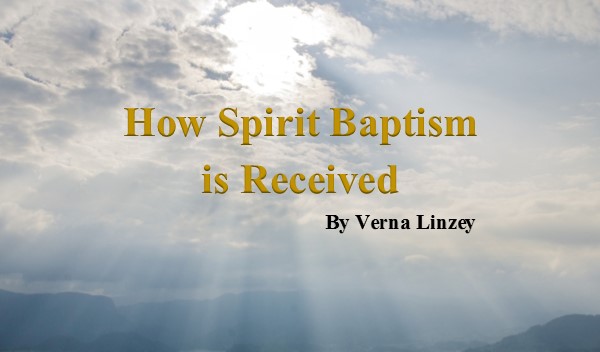How Spirit Baptism is Received

The history of the Day of Pentecost dates back to 1500 BC when God gave Moses the Law on Mount Sinai. Fire appeared to symbolize God’s presence. On the Day of Pentecost in Acts, God made His presence known through the fire and gave us the Holy Spirit. The difference between Sinai and Acts was that His presence would now be permanent under the New Covenant. Jesus said that He would never leave us nor forsake us and He fulfilled His Word by sending the Holy Spirit. When the Holy Spirit came, the fire separated and hovered above the head of each believer present. The Holy Spirit gave tongues as a manifestation of His indwelling. These tongues were as diverse as the separation of the flames and, like the Holy Spirit, were permanently given.
According to Acts 1:14-15 about 120 believing Jewish people (men, women and children) waited in Jerusalem. Among them were the 12 apostles, including Matthias who replaced Judas. According to Acts 2:1-4 these were the first believers to receive the baptism in the Holy Spirit. As a result, 3,000 people became new followers of Jesus. The disciples did not know that the crowd of international Jews could understand what they were speaking; all they knew was that they were praying in the Spirit. They were not even preaching. If they were preaching they would have gone to where the crowd was eating, drinking, and celebrating the Feast of Pentecost.
The Holy Spirit came with fire and the sound of a whirlwind. These believing Jews were worshiping in their native tongue (their intellect) and then began praying in the Spirit. The unbelieving Jews heard the whirlwind, saw the fire and knew God was present. When they went to the nearby house where the disciples were praying, they saw and heard believers worshiping in the Spirit, and heard the Gospel in their own languages. This was corporate tongues offered up to God.
According to Acts 2:5-13, cynics accused the disciples of drunkenness. This is when the preaching began. Peter, responding to the charge of drunkenness, preached in Acts 2:14-18 that this was what Joel prophesied (Joel 2:28-29). Many Jews who then believed asked, “Brothers, what shall we do?” Peter said to them in Acts 2:38-39 that if they repented, they too would receive the Holy Spirit, as promised to all their descendants. In other words, Peter showed that salvation was the prerequisite for receiving the Holy Spirit and that this gift was expected to be manifested by speaking in tongues.
The Jews received the baptism in the Holy Spirit in 33 A.D. through the divine sovereign will of God.
The Baptism in the Holy Spirit in Samaria
Acts 8:4 tells us that Philip the evangelist was led by God to preach salvation to the Samaritans and perform miraculous signs. God delivered these Samaritans of evil spirits and healed numerous paralytics and crippled individuals. Consequently, many Samaritans were saved and baptized in water. We know that the Samaritans technically received the Holy Spirit simply because they were saved. Romans 8:9 says that if people belong to Christ then they have the Holy Spirit. Luke challenges us with his terminology when he says that the Holy Spirit had not come upon them. The problem was that the Samaritans did not manifest the Holy Spirit through speaking in tongues at that moment.
Category: Spirit, Winter 2018


